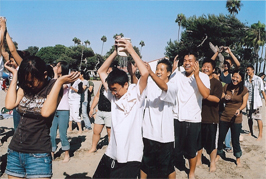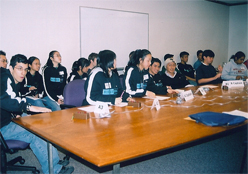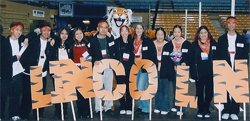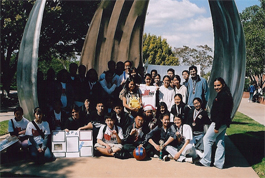About the Lincoln Heights Tutorial Program
The Lincoln Heights Tutorial Program was founded in 1985, and from 1985-1998, the Lincoln Heights Tutorial Program was in care of a non-profit organization called Blessed Hope Fellowship/Foundation. In 1998, we became our own incorporation as a non-profit, 501(c)(3), IRS #95-4682502. Since our founding, the Lincoln Heights Tutorial Program has had a vision to raise urban children and youth to become role models back into their own communities, and to assist them to go on to college.
Our emphasis is on college preparation and leadership development skills for teens, training youth to give back to their own communities through community service and the tutoring of younger children, and homework assistance for children grades K - 9th. We currently serve over 1075 Hispanic and Asian children and youth between the grades K-12th, with over 570 of the 1075 being youth from the 7th -12th grades. The Lincoln Heights Tutorial Program currently consists of 6 tutoring centers, 2 youth clubs, 1 community advocacy committee “Increase the Peace”, and 3 high school campus academic clubs, serving the Lincoln Heights, Boyle Heights, El Sereno, and Chinatown communities. Two youth clubs, one tutoring center, the community advocacy committee “Increase the Peace”, and three academic clubs are located in the Lincoln Heights Community. One tutoring center is located in Chinatown. Our 3rd tutoring site is located in Boyle Heights at the Hollenbeck Youth Center. Our 4th tutoring site is located near the Boyle Heights/East L. A. border, at the El Centro De Ayuda Facilities. Our 5th tutoring site is located in El Sereno, at the Barrio Action Youth & Family Center. Our 6th site is located at the Plaza de la Raza building.
After-school programs
Our after-school tutorial programs serve children and youth in homework help, math, reading, writing, and computer literacy. Our youth clubs serve to build leadership skills amongst the local high school youth, and to give them opportunities to serve their own community. In our youth clubs, we have raised and continue to raise inner city youth to staff the sites, as tutors and role models for the children that come for tutorial services and youth groups. Our current work also involves racial reconciliation amongst Hispanic and Asian children and youth.

It is our goal to raise many children and youth from the communities that we serve, to become great role models, attend college, and to be individuals who have a heart to serve their community through service projects and other volunteering opportunities. This works to reduce the flow of children and youth from choosing into a life of gangs, violence, and drugs, in these inner-city communities, and begins a transformation process of the community. In addition, our youth are engaged in community service projects that allow them to model positive achievements instead of the usual vandalism and destructive acts of teens in these neighborhoods. All of our Programs have been designed throughout the years, to maximize the influence and experiences of children and youth in our community. Our after school tutoring sites provide a safe and quiet studying environment for our children and youth, with our high school and youth club college alumni being role models and providing the homework assistance for the next generation of children.
Youth clubs

The Lincoln Heights Tutorial Program has two youth clubs: the Junior Youth Club (JYC) and Youth United for Community Action (YUCA). Each of our youth clubs provide mentoring, college tours, community service projects, advocacy events, recreational activities, and leadership skills training. Members of our youth clubs are encouraged and given opportunities to care for their own community and care for one another. Each of our youth clubs also have leadership teams that are elected for one year terms by the members, to facilitate events, plan the calendar year, and to serve the rest of the members. We have over 450 youth that are members of our 2 youth clubs.
High school academic clubs
LHTP also supports three academic clubs at Lincoln High School - the Academic Decathlon, M.E.S.A., and the Science Bowl Club. Our work is to partner with teachers who are the sponsors and coaches of these clubs, to assist them with funding, and with partnership, as these youth compete against others schools in the regional competitions.

The Science Bowl Club
The Science Bowl Club involves a team of 30 youth from Lincoln High School who are interested in furthering their knowledge of science beyond that which their school provides. They study a range of science topics including: Chemistry, Biology, Math, Physics, Astronomy, Earth Science, Computers, and General Science. They hold weekly meetings and have field trips to prepare themselves for the annual Science Bowl Tournament held at the DWP downtown Los Angeles Facilities in late Winter.

The Academic Decathlon
The Academic Decathlon involves 15 youth (9 competitors and 6 alternates) who compete in a rigorous academic competition with high school students from 60 other LAUSD schools. These 9 representatives are composed of 3 Honors, 3 Scholastic, and 3 Varsity students. They study 10 subjects for nine months, along with their regular school load. These subjects include Science, Social Science, Math, Economics, Language and Literature, Art, Music, Speech, Essay, and Interview. It takes a lot of commitment and hard work to be on the team, but it is worth it for these students because of valuable knowledge gained and the preparation they get for life in college and the real world.

M.E.S.A. Club
M.E.S.A. Club of Lincoln High School (Math Engineering Science Achievement) serves 75 high school youth. M.E.S.A. challenges students to be creative in order to produce innovative projects such as model bridges and planes. It also gives students opportunities to develop math, science, and communication skills. Each year, students prepare projects ahead of time to compete in a preliminary competition in the spring with other M.E.S.A. students from local high schools. Students who place, will go on to enter their final projects into the Finals, held one month after the Prelims.